- Home
- Melissa Marr
Radiant Shadows tf-4 Page 12
Radiant Shadows tf-4 Read online
Page 12
She didn’t run. Instead, she cocked her hip and glared at him. “Do you have any idea what would happen if you killed me?”
Bemused, he watched her face him with challenge clear in her every movement and word. “Tell me,” he said.
“Irial, Gabriel, Niall—they’d all be after you.” She had a hand on each hip, chin raised, shoulders back.
“You invite attack with that posture.” He gestured at her hands. “The footing is good though.”
“What?”
“Your feet. It’s a steady stance if I were to attack you,” he clarified. He wanted to train her. He’d tasted her blood: he knew she was well on her way to becoming equal to a Gabriel in strength.
“Are you planning on attacking me?”
“No, I’d like to speak with you. It’s a bit more civilized,” he said.
“Right. Civilized conversation after you track me, grab me, and suggest killing me. I guess you are High Court after all, huh?” She shook her head and glanced at her beast. It pressed its still-reptilian muzzle against her shoulder as she spoke. Whatever conversation they were having was locked from his hearing.
He waited.
“Fine… let’s talk.” She tensed, but other than that, her aggressive posture was unchanged.
“Come.” He turned and walked into the brightness of the street. He didn’t offer her his arm, didn’t wait to see if she followed.
He repressed all of those untidy things he felt, hid them away, and kept his expression stoic as he’d long since learned to do. It was foolishness, his urge to protect her, but he very much wanted a solution that didn’t involve Ani’s death.
Especially by my hand.
He walked through the streets, following the twists of the poorly laid-out city design until he reached the warehouse district. The few faeries who saw him would undoubtedly report his presence to Niall and Irial. Most faeries wouldn’t be foolish enough to carry the news to Gabriel, but would leave that to their king or former king. Hounds’ tempers were easily sparked and slowly quelled. Only a faery looking to be injured would deliver news of Devlin’s contact with Ani to Gabriel. As order keepers of opposing courts, Gabriel and Devlin didn’t mesh well.
Devlin paused at an intersection. Mortal cars raced by, and he marveled at the appeal of traveling in the tangled cages of metal. Much of the mortal world seemed unnatural.
Unlike Faerie.
He wondered, as he had for centuries, if he could adjust to living in the world of mortals. Bananach had. Many faeries had adjusted when the Dark King pulled them out of Faerie so long ago. Others sickened. Some died or went mad. Still others flourished. Devlin, for his part, felt too closed-in by the pace of it.
Too much information was always bombarding the senses: horns and engines, neon glows and blinding lights from signs, smoke and perfumes from mortals. It was jarring, and when it wasn’t, the peculiarity of visuals and weather left him off-kilter. It was a curious world where nothing but ice or water fell from clouds, where food tasted the same each time, where the climate was sorted by location and the spin of the planet. Faerie’s fluidity made more sense to him.
He paused. Across from them, a window was filled with brightly colored shoes. Cars were careening down the street. Voices clashed, and sirens shrilled.
“What are you looking at?” Ani was beside him then. She appeared tinier up close, or maybe she only seemed that way because she wasn’t radiating aggression. The top of her head was level with his shoulder; the edges of her garish pink- tipped hair brushed against his upper arm as she turned her head to look down the street.
A woman too thin to be healthy stood on the other side of the window looking at shoes; her face was illuminated by the harsh lights inside the store. She glanced outside, but her gaze flickered away before fully settling on him.
Devlin turned his attention to Ani. Like Rae, she was unafraid of him. Even his queen found him frightening: it was the order of things. Faeries should fear him. Death in Faerie—or by order of Faerie—was his function. Ani seemed foolishly nonplussed by this. Once she’d learned that there was no immediate fatal threat, she’d become bold. Is that why Rae wanted me to see Ani? Did she know? It couldn’t be. There was no way for Rae to know that Ani would be unafraid. Still, such fearlessness near him was rare, and he cherished it.
“Hell-o?” She nudged him. “What are you looking at?”
“We need to cross here.” He wasn’t sure how fast she could move, but he’d noticed that mortals were slower. She wasn’t a true mortal, and her sire was one of the fastest sorts of faeries. Thinking of her getting crushed by the metal racing past them was disconcerting.
She matters.
He gripped her arm just above her elbow and started walking, forcing her to scurry to keep pace with his longer stride.
She yanked her arm free. “What are you doing?”
“Helping you cross the street.” He narrowed his eyes at her tone. Boldness was only amusing so long. When it interfered with his objectives, it ceased being entertaining. “The vehicles speed, and you are still somewhat mortal. I’m not sure how fast mortals—”
“I am a Hound.” She raced down the block.
From a distance, he could see her belligerent posture. It was foolhardy, but not unexpected. He should’ve kept a better grip on her.
She’s unrestrained. It’s— He froze. Thoughts, action, everything around him seemed to stop as he watched Bananach come up behind Ani and slide an arm around the Hound’s shoulder.
NO.
Before the objection was a completed thought, Devlin stood in front of them. “Step away, Sister.” “For what coin?” She curled her hand around Ani’s shoulder so that her talon-tipped fingers furrowed skin, not piercing but deep enough that the Hound would bruise.
He had chosen to be ruled by logic, and logic said there was an answer here that would get Ani safely out of War’s reach, but it wasn’t logic that rode in his words. “She’s mine. I have taken her into my keeping.”
“She’s alive.” Bananach rubbed her face against Ani’s hair in a feline gesture that seemed peculiar for the raven- faery. “This is good. I find that I need her not-dead. She has a mission now. Don’t you, puppy?”
Ani caught his gaze. She didn’t look afraid, despite her situation, and Devlin wondered fleetingly if she was impaired. He’d seen that in some of the mortal-faery mixes, a lack of instinctual fear. Has she no sense of self-preservation?
She widened her eyes, as if she was willing thoughts to him.
Devlin stared at her, trying to make sense of whatever she was trying to convey.
She pursed her lips and almost imperceptibly tilted her head. Her gaze shot pointedly to the left.
Sitting on the curb beside him was her steed, looking like a car now. Her intention seemed to be to use the beast as a weapon. The results of such an attack weren’t likely to be severe, but it would upset Bananach—which would lead to her striking Ani.
Which would result in my injuring my sister.
Devlin moved forward, putting himself between the steed and his sister. He didn’t always like his sister- mothers, but he was sworn to keep them safe to the best of his ability.
Even from me.
Moving as close to his sister as he could get, he made himself a barrier to Bananach’s injury.
Ani glared at him.
“You made mistakes. Sisters know.” Bananach craned her neck forward so her cheek rubbed Ani’s face. “I won’t tell our secrets.”
Devlin weighed and measured the words. He couldn’t tell Bananach anything false. I wish Rae was here. Being possessed so as to allow his lips to form a lie would be incalculably useful just then.
“You won’t tell secrets either; will you, little pup?” Bananach spun Ani so they were face-to-face. “You’ll go to your court. He can help. Is that why you came, Brother? To help?”
Bananach looked over Ani’s shoulder at Devlin.
He held her gaze and said, “Yes. I’ve come
to help.”
With most faeries, Bananach would press; she would insist on clarity of word—but it was not so with him. She believed him. Bananach kissed Ani’s forehead. “Trust him, little one. He is wise.”
Some part of Devlin’s long-suppressed emotions cringed at those words. For everything she’d done, she was still his creator. Betraying her today—as he’d betrayed Sorcha fourteen years ago—wounded him.
For you, Ani.
The faery in question backed away from Bananach. She shot a glance at Devlin. Then she walked toward her steed. A tremble in her hand as she reached out to the door handle revealed her fear—or perhaps her anger.
Silently, he turned his back on his sister and followed Ani.
He slipped into the passenger seat and barely had the door closed before Ani peeled out. He could see his sister in the rearview mirror: she stood staring after them.
Ani cranked the stereo; angry guitars and shrieking voices came blasting out of the speakers.
He put a hand on hers.
She jerked away.
“Are you helping Bananach?” Ani didn’t take her gaze from the road. She was speeding between cars and occasionally getting close enough that Devlin braced for the sound of scraping metal. “She said—”
“If I told her I wanted to remove you from her reach, do you think she’d have let us leave?”
She looked over at him. “Why should I trust you?”
“Maybe you shouldn’t.” He had just betrayed his second sister for Ani, but he couldn’t say he wouldn’t kill Ani. If the options were Ani’s life or the good of Faerie, he’d act in Faerie’s best interest. “I did not come seeking your death or injury, Ani.”
Her hands tightened on the wheel. “But?”
He looked over at her, wishing that she’d stayed safely hidden, wishing she’d never attracted Sorcha’s attention before or Bananach’s now. He couldn’t tell her those things, not at the moment, not when she was already so furious and frightened. He couldn’t not tell her anything either, so he said, “But you have something she wants, something she believes will allow her to defeat Sorcha, to become more powerful than War should ever be, and I cannot let her have it.”
“Why?”
He sighed. “Do you want to help her?”
“No, but—”
Devlin interrupted, “And I prefer not to have to kill you. If you help her, I will have to.”
After that, neither of them spoke, not as she blared the music to obscene volumes, not as she drove carelessly enough that he was quite sure of her parentage, and not as she gunned the engine as they departed Huntsdale.
Please let me find a solution that isn’t her death.
Chapter 18
Rae didn’t truly sleep, but she could reach a meditative silence that felt very energizing. She felt as if she floated in a gray nothingness where the world couldn’t reach her.
“You!”
Rae focused her attention on the cave, pulling herself back to the state in which she typically existed, staring at the rock walls she had called “home” these past years. In the shadowed alcove, the queen of Faerie stood waiting. Her left hand held a broken mirror. All around her feet shards of reflective glass were scattered like the bones of the dead on an abandoned battlefield.
“None of these work as the one you made did.” Sorcha dropped the mirror to the floor, where the glass pieces joined the others already there. “You were in my mind.”
How did she find me?
Rae winced. She feigned comfort as if she merely rested on an oblong rock on the floor of the cave. It was an illusion, but it was the sort that made her feel anchored in the waking world. She looked directly at Sorcha and said, “I was.”
“I didn’t give you leave to live in Faerie. You never came to ask my permission,” Sorcha said. The words lilted at the end, a question that wasn’t meant to be. Her eyes were unfocused, her gaze not centered on Rae but on something beyond. She wasn’t as lovely here as she was in the dream world. Here, her imperiousness was off-putting; her rigidity was disconcerting. The flamelike vitality of her dream-self had been muted, like Rae was seeing her through a thick glass.
Rae would feel sympathy, but Sorcha was the queen Rae had feared, the faery who kept Devlin bound to a path that didn’t suit him. At her word, Devlin could die; Rae could die. That reality nullified any sympathy Rae would otherwise feel.
She stood and walked deeper into the shadows, putting more distance between them, standing as if she were leaning against the cave wall. Distance wouldn’t keep her safe, but it made her feel less unsettled by the High Queen’s presence.
“Can I ask permission now?”
Sorcha paused. “I’m not sure. I don’t know that I like your willingness to walk in my dreams…in anyone’s dreams. It’s indecorous.”
Rae kept silent. Once, in her mortal life, being accused of indecorous behavior was a severe charge. Rae’s long-ago instincts made her want to apologize for being inappropriate, but she hadn’t done anything untoward: she’d tried to help ease the pain of a grieving faery. The apology she owed was to Devlin, for exposing herself. So Rae stayed silent, hands folded demurely, gaze lowered. The semblance of propriety seemed a fitting response.
“Yet, I’m not sure how to kill you. The lack of a body to bleed complicates the matter.” Sorcha was as callous as Devlin appeared to most faeries, as unyielding as logic should be. It was chilling.
“I see.” Rae nodded. “Have you tried wishing me dead?”
“No.”
“May I ask—”
“No.” Sorcha was suddenly seated on a silver throne that sat atop a dais. Neither had been there a heartbeat ago. The queen had willed a chair into being, and a floor, and marble pillars, and—
We aren’t in the cave. Rae shivered. Obviously, Sorcha could relocate Rae. Or did she move the world around us?
“Fortunately for you, I have decided that I have use of you.” Sorcha raised a hand in a beckoning motion. Two mortals came forward. They were both veiled. Diaphanous gray gauze hung over their faces and draped their shoulders. Shifts of a similar cloth covered their bodies. Their arms and feet were bare.
Rae wondered if she’d met them when she’d walked in dreams or worn Devlin’s body, but she couldn’t tell from the slight glimpse of bare arm or foot. She stayed silent before the High Queen.
“Sleep,” Sorcha told the mortals. “Here.”
The floor was undoubtedly beautiful; mosaic tiles created elaborate art that they trod on as if it were merely a base surface. It was not soft or inviting, however.
The mortals lowered themselves to the ground obediently. They crossed their bare ankles and folded their hands over their stomachs, looking like cloaked corpses at a wake. Still silent, they were stretched prone at their queen’s feet. What they weren’t doing, however, was sleeping.
Rae debated commenting. If she spoke, there was a chance Sorcha would be further displeased. If they slept, Rae suspected she’d be given direction to invade their dreams for some reason Sorcha had devised but not yet shared.
“Tell me what they dream,” Sorcha demanded.
“They aren’t asleep.”
“Of course they are. I told them to sleep. They’ll sleep.” Sorcha’s dispassionate gaze invited no disagreement, but the High Queen was wrong.
“I can’t go into their dreams if they aren’t dreaming,” Rae lied. She could give them daydreams. It took far more concentration, but if they were creative—which most mortals in Faerie were—she could even entice them to sleep. She hadn’t had much experience with that because Devlin kept her so carefully hidden, but there were a few tricks Rae had practiced covertly when mortals or faeries were within reach.
“Make them dream.” Sorcha smoothed down her skirts as she sat on her uncomfortable throne. Her attention to the fall of her attire was more concentrated than her attention to the mortals at her feet.
“They’re awake.” Rae wasn’t sure how much disappointment the H
igh Queen would forgive. She wished that she’d told Devlin good-bye.
“Sleep,” Sorcha repeated to the mortals, but they did not. The High Queen could change everything around them, but even she could not control the biological responses of sentient beings.
“Perhaps if you gave them pillows and something softer than the floor,” Rae suggested.
Before the words were fully said, the room shifted. The mortals were now reclining on beds that were several feet thick, more pillow than mattress; thorny frames twisted up around the pillow-mattresses. From the thorns, Spanish moss hung down like curtains.
The mortals had not moved. The world around them had shifted, yet they remained in the same deathlike positions they’d assumed. Sorcha, for her part, had no reaction to any of it. This was the High Court that Devlin had sheltered Rae from; this was the High Queen in all of her disdainful glory.
Rae, however, was not of the High Court. She was in Faerie by accident, and at first she was only with Devlin out of happenstance. Over time, that had changed: Devlin mattered.
And would be quite welcome right now.
The queen of Faerie lifted her gaze and stared at Rae. “Tell me what they dream. Now.”
On the bed, the mortals breathed slowly and evenly. They fell into sleep, and Rae followed the first one into her dreaming world.
The mortal was a worker of fabrics. In her dream, she was in a great open warehouse. It was piled high with bolts of fabric, swaths of fur, and vats of odd items. Uncut stones and sinuous metals were piled at the ready.
The mortal sat at a table that spanned the length of the room. On it, sketches were illuminated by backlighting, so that the parchment they were drawn upon seemed to glow. Some of the illustrations were already pinned to model forms. Others were cut from the fabrics, but not pinned or stitched together.
The dream wasn’t particularly interesting to Rae. It was simply an artist wishing for more tools with which to create new art. Such dreams were not the most tedious ones in Faerie, but they weren’t particularly fun to tweak either. Mortals were resistant to dream alteration. Artists were worse still. They’d been brought to Faerie for their creativity, and that creativity was their essence.

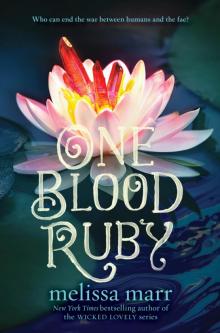 One Blood Ruby
One Blood Ruby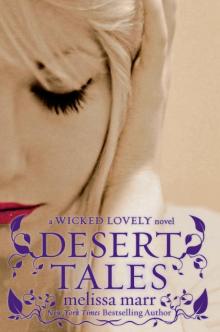 Desert Tales
Desert Tales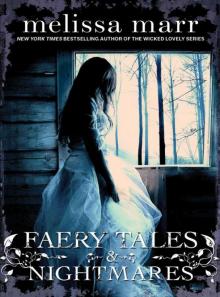 Faery Tales & Nightmares
Faery Tales & Nightmares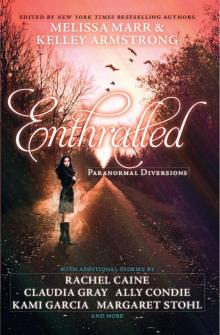 Enthralled: Paranormal Diversions
Enthralled: Paranormal Diversions Wicked Lovely
Wicked Lovely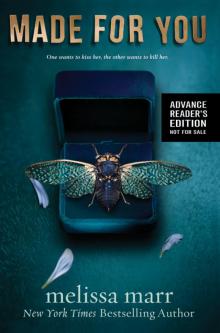 Made for You
Made for You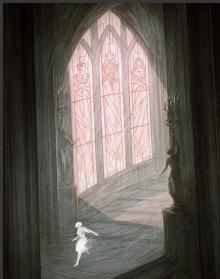 The Maiden Thief
The Maiden Thief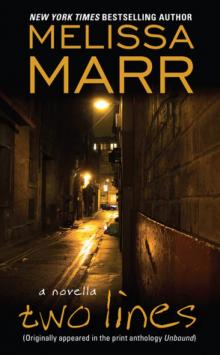 Two Lines
Two Lines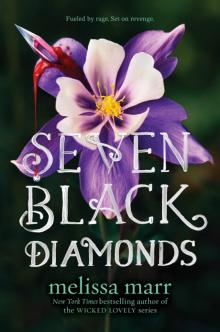 Seven Black Diamonds
Seven Black Diamonds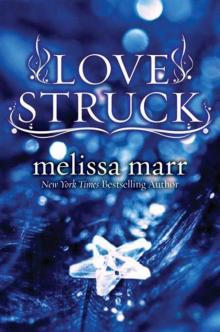 Love Struck
Love Struck Guns for the Dead
Guns for the Dead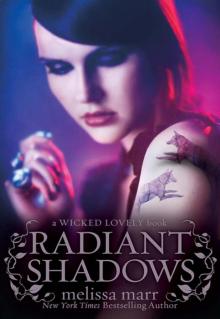 Radiant Shadows
Radiant Shadows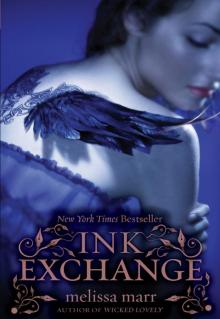 Ink Exchange
Ink Exchange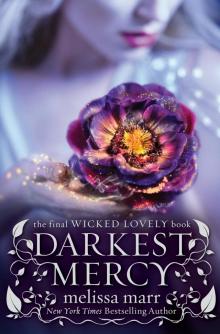 Darkest Mercy
Darkest Mercy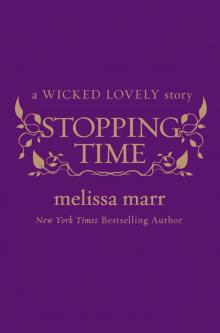 Stopping Time and Old Habits
Stopping Time and Old Habits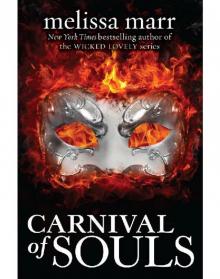 Carnival of Secrets
Carnival of Secrets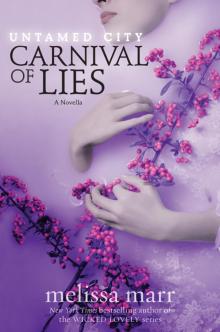 Carnival of Lies
Carnival of Lies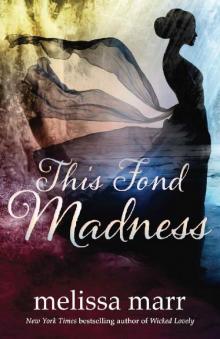 This Fond Madness
This Fond Madness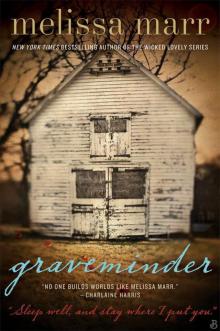 Graveminder
Graveminder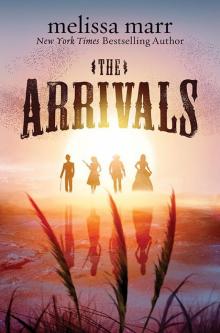 The Arrivals
The Arrivals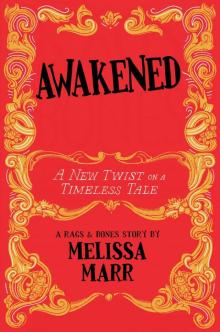 Awakened: A New Twist on a Timeless Tale
Awakened: A New Twist on a Timeless Tale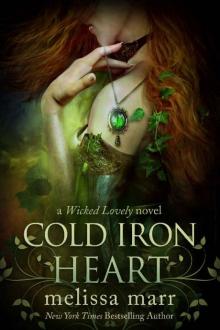 Cold Iron Heart: A Wicked Lovely Novel
Cold Iron Heart: A Wicked Lovely Novel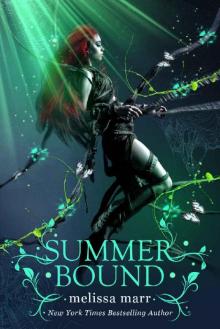 Summer Bound: A Wicked Lovely Story
Summer Bound: A Wicked Lovely Story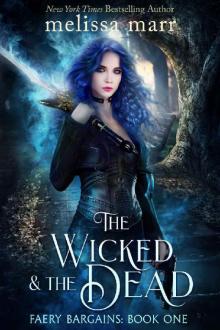 The Wicked & The Dead (Faery Bargains Book 1)
The Wicked & The Dead (Faery Bargains Book 1)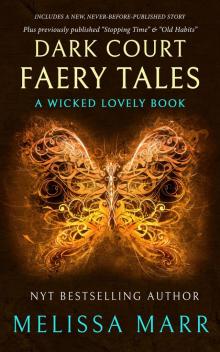 Dark Court Faery Tales
Dark Court Faery Tales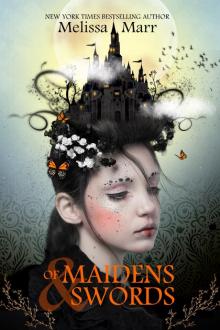 of Maidens & Swords
of Maidens & Swords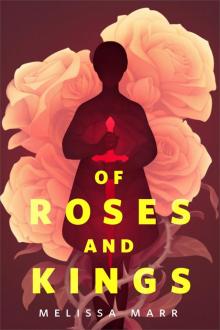 Of Roses and Kings
Of Roses and Kings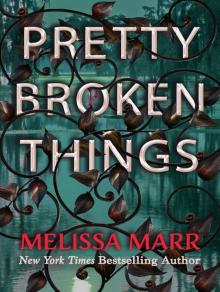 Pretty Broken Things
Pretty Broken Things Enthralled
Enthralled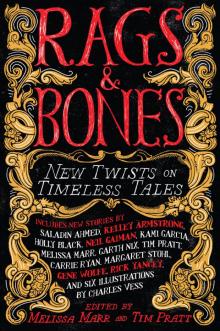 Rags & Bones
Rags & Bones Ink Exchange tf-2
Ink Exchange tf-2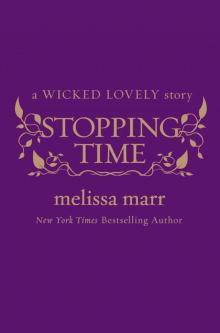 Stopping Time
Stopping Time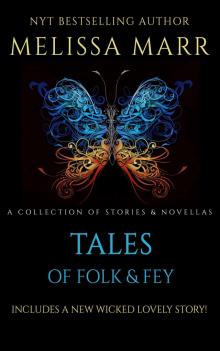 Tales of Folk & Fey
Tales of Folk & Fey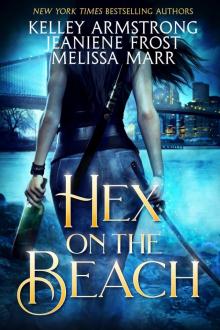 Hex on the Beach
Hex on the Beach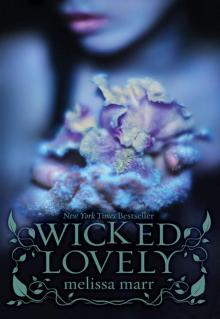 Wicked Lovely Free with Bonus Material
Wicked Lovely Free with Bonus Material Wicked Lovely tf-1
Wicked Lovely tf-1 Wicked Lovely with Bonus Material
Wicked Lovely with Bonus Material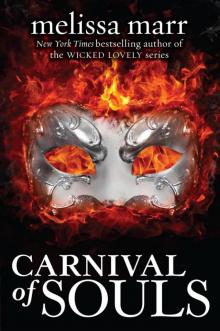 Carnival of Souls cos-1
Carnival of Souls cos-1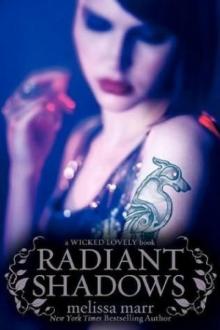 Radiant Shadows tf-4
Radiant Shadows tf-4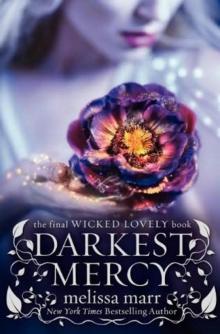 Darkest Mercy tf-5
Darkest Mercy tf-5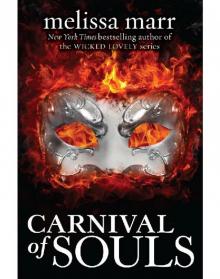 Carnival of Souls
Carnival of Souls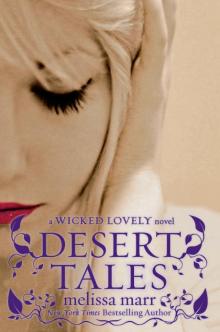 Desert Tales: A Wicked Lovely Companion Novel
Desert Tales: A Wicked Lovely Companion Novel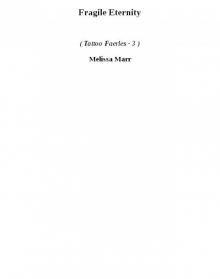 Fragile Eternity tf-3
Fragile Eternity tf-3 Old Habits
Old Habits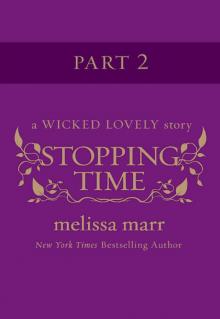 Stopping Time, Part 2
Stopping Time, Part 2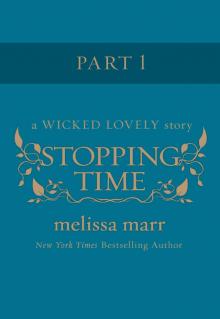 Stopping Time, Part 1
Stopping Time, Part 1